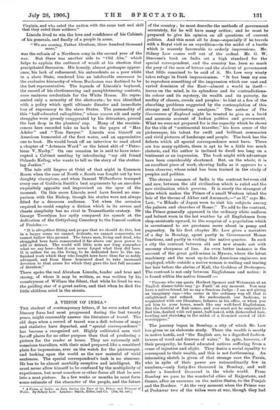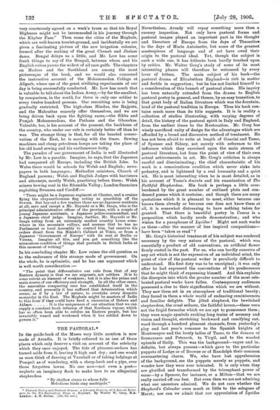A VISION OF INDIA. * THE student of contemporary letters, if
be were asked what literary form had most progressed during the last twenty years, might reasonably answer the literature of travel. The old days when a record of travel was a dull volume of maps and statistics have departed, and "special correspondence" has become a recognised art. Highly cultivated men visit far-off places for no other purpose than that of producing a picture for the reader at home. They are extremely self- conscious travellers, with their mind prepared like a sensitised plate for impressions, ever on the watch for the picturesque, and looking upon the world as the raw material of vivid sentences. The special correspondent's task is no sinecure. He has to be almost morbidly receptive and intelligent. He must never allow himself to be confused by the multiplicity of experiences, but must somehow or other focus all that he sees into a neat picture. In a few weeks or months he must form some estimate of the character of the people, and the future • A Vision of India: as Seen during the Tour of the Prince and Princess of Wales. By Sidney Low. London : Smith, Elder, and Co. [105. 6d, net.]
of the country ; he must describe the methods of government accurately, for he will have many critics; and he must be prepared to give his opinion on all questions of current politics. And this must all be done—especially if be travels with a Royal visit or an expedition—in the midst of a bustle which is scarcely favourable to orderly impressions. Mr. Sidney Low comes well out of the ordeal. Mr. G. W. Steevens's book on India set a high standard for the special correspondent, and the country has been so much the prey of the man of letters and the student of government that little remained to be said of it. Mr. Low very wisely takes refuge in frank impressionism. "It has been my aim to reproduce something of the impression which our vast and varied dominion of the East—almost a world in itself— leaves on the mind, in its splendour and its contradictions, its colour and its mystery, its wealth and its poverty, its medley of classes, creeds and peoples: to hint at a few of the absorbing problems suggested by the contemplation of this
strange and fascinating amalgam." The author of The Governance of England might be trusted to give us a lucid and accurate account of Indian politics and government. What we were not prepared for is the capacity which he shows for the role of "sentimental traveller," his keen sense of the
picturesque, his talent for swift and brilliant summaries and vivid pictures of landscape and people. The book has the defects which all special correspondence must have. There are too many epithets, there is apt to be a little too much rhetoric, and the author is inclined to dwell too long on a sentiment or an impression. The book might with advantage have been considerably shortened. But, on the whole, it is an excellent piece of work, showing India as it appears to a keen observer, whose mind has been trained in the study of peoples and politics.
The eternal romance of India is the contrast between old and new, between the old civilisation which is ruled and the new civilisation which governs. It is surely the strangest of fates which makes the Prince of a small Western island the heir of the throne of Akbar and Auranzeb,—" as if," says Mr. Low, "a Mikado of Japan were to visit his subjects among the palaces and churches of Rome." To add to the contrast, the Prince generally appeared in the ordinary white uniform and helmet worn in the hot weather by all Englishmen from shop-assistants upward, to the surprise of a population which is accustomed to see greatness move about in pomp and pageantry. In his first chapter Mr. Low gives a narrative of a day in Bombay, spent partly in Government House functions, and partly in visiting the native quarter. In such a city the contrast between old and new stands out with uncanny sharpness of line. An even better instance is the account of the great gold-mines in Mysore, where the latest machinery and the most up-to-date American engineers are employed, while outside a native woman is wailing and tearing her hair before the shrine of Kali, the Goddess of Destroyers.
The contrast is not only between Englishman and native: it is found within the native himself :— " Persons who can quote Herbert Spencer and Weismann at an English dinner-table may go Fanti ' at any moment. You may have a native friend, let us say a Sessions Judge—I am not giving an imaginary case—who seems in the ordinary way all that is enlightened and refined. He understands our fashions, is acquainted with, our literature, behaves in his office, or when you ask him to your house, much like any well-bred Englishman. But the festival of Kali oomes, and you must not be surprised to find him, daubed with red paint, half-naked, with dishevelled hair, howling and shrieking in the midst of a frenzied crowd of idol- worshippers."
The journey began in Bombay, a city of which Mr. Low has given us an elaborate study. There the wealth is mostly in native hands, and "the English are, in a dignified fashion. hewers of wood and drawers of water." In spite, however, of their prosperity, he found educated natives suffering from a sense of injustice and slight. They desire a. social equality to correspond to their wealth, and this is not forthcoming. An interesting sketch is given of that strange race the Parsis, who in spite of their power are extraordinarily few in numbers,—only forty-five thousand in Bombay, and well under a hundred thousand in the whole world. From Bombay we pass to the wonderful cities of Rajputana, and thence, after an excursus on the native States, to the Punjab and the Borders. "At the very moment when the Prince was at Peshawar two of the tribes were at war, though they had very courteously agreed on a week's trace so that his Royal Highness might not be incommoded in his journey through the Khyber Pass." Then come the cities of the Moghuls, which are well-known tourist-ground, and incidentally we are given a fascinating picture of the new irrigation colonies, formed after the making of the great Chenab and Jhelam dams. Bengal delays us a little, and Mr. Low has some frank things to say of the Bengali, between whom and his English rulers yawns the widest of all race gulfs. The chapters on Madras and the Southland are among the most picturesque of the book, and we would also commend the instructive account of the Mohammedan College at Aligarh, where one of the great civilising experiments of our day is being successfully conducted. Mr. Low has much that is valuable to tell about the Indian Army,—by far the smallest, by comparison, in the world, for there is only one soldier to every twelve hundred persons. Our recruiting area is being gradually restricted. The high-class Hindus, the Rajputs, and the Mahrattas scarcely offer themselves, and we are being driven back upon the fighting races,—the Sikhs and Punjab Mohammedans, the Pathans and the Ghoorkas. Valuable, too, is his account of the peasant, the backbone of the country, who under our rule is certainly better off than he was. The strange thing is that, for all the boasted conser- vatism of the East, he is moving with the times. Sewing
machines and cheap petroleum lamps are taking the place of his old hand sewing and his earthenware butty.
The paradox of our government of India is well illustrated by Mr. Low in a parable. Imagine, he says, that the Japanese had conquered all Europe, including the British Isles. In Wales there would be schools for Welsh and English; news- papers in both languages ; Methodist ministers, Church of England parsons; Welsh and English Judges with barristers and attorneys, mostly Welsh, practising before them ; Welsh miners hewing coal in the Rhondda Valley ; London financiers exploiting Swansea and Cardiff:—
" There might be a Japanese regiment at Chester, and a cruiser flying the chrysanthemum flag acting as guardship off the Severn. But beyond a few traders there are no Japanese residents at all, save and except a Mr. Hayashi or a Mr. Inaga, who is the principal administrative officer of the province, with a couple of young Japanese assistants, a Japanese police-commandant, and a Japanese chief judge. Imagine, further, Mr. Hayashi or Mr. Inaga ruling from an extremely modest country house some- where in the mountain valleys, and assume that he has no Parliament or local Assembly to control him, but receives his orders direct from the Mikado's Cabinet at Tokio, or from a Japanese 'Government of Europe' with its seat at Berlin or Vienna. Imagine all this, and you get something like the miraculous condition of things that prevails in British India at this moment of writing."
In his concluding chapter Mr. Low raises the old question as to the endurance of this strange mode of government. On the whole, he is optimistic, and he has one argument which is well worth consideration :—
" The point that differentiates our rule from that of any Eastern dynasty is that we are migrants, not settlers. It is to some extent an element of weakness ; but it is also the prime and main source of our efficiency and strength. In all the other cases, the masculine conquering race has established itself in the country, and presently it has suffered that deterioration which seems, as if by a law of nature, to overtake every despotic monarchy in the East. The Moghnls might be masters of India to this hour if they could have bred a succession of Babers and
Akbars It is the uniqueness of our situation that we can supply a constant fresh infusion of that Northern vigour, which has so often been able to subdue an Eastern people, but has invariably waned and weakened when it has settled down to govern it."







































 Previous page
Previous page